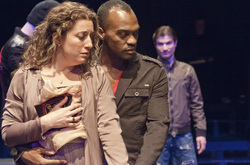back to press page

May 04, 2012|By Don Aucoin
Scholars think it’s quite possible that Shakespeare’s “Troilus and Cressida’’ was never performed during his lifetime. It’s not staged all that often nowadays, either.
Why? Well, when no less a Shakespeare authority than Yale’s Harold Bloom describes “Troilus and Cressida’’ (in “Shakespeare: The Invention of the Human’’) as “the most difficult and elitist of all his works,’’ you know you’re in for a challenge.
But Tina Packer is always up for one of those.
There are few more insightful interpreters of the canon than Packer, the founder of Lenox-based Shakespeare & Company. She has chosen to give her Actors’ Shakespeare Project production of “Troilus and Cressida’’ a rollicking, absurdist flavor, but with a bitter aftertaste.
Packer’s approach makes sense for Shakespeare’s dark, astringent take on those twin follies, love and war. “Troilus and Cressida’’ offers a decidedly nonheroic view of the Trojan War, which Homer, in the “Iliad,’’ depicted more glamorously. So when soldiers in the ASP production leap off the ground for an exultant chest-bump, or when one character warms up for battle by speed-boxing on the splayed hands of another, one doubts that the playwright, at least, is spinning in his grave.
It’s a decidedly tangled tale, though. If you’re new to Shakespeare, this is definitely not the play with which to begin. There are times when this “Troilus and Cressida’’ registers primarily as a series of heated, threatening speeches shouted by one character at another. Yet riches abound in the language, and even on a bare-bones set, with the audience grouped around the stage on four sides in the Modern Theatre, Packer deploys her gift for compelling imagery and for metaphor laden with meaning.
The play begins and ends with a tableau of men frozen in positions of combat, as if humanity is eternally at war. Which is clearly how it feels to the warriors in “Troilus and Cressida’’ as the Greek siege of Troy drags into its wearying seventh year. (There are implicit parallels to the United States’s protracted military involvement in Iraq and Afghanistan, a notion underscored by the fact that the ASP actors are largely attired in contemporary garb.)
Troilus, ably portrayed by Maurice Emmanuel Parent, is a prince of Troy who embarks on a torrid but ill-starred romance with a Trojan woman named Cressida (Brooke Hardman, nicely alternating passion and poignancy). Cressida’s uncle, Pandarus, helps facilitate the affair between the duo. As played by the always inventive Robert Walsh, Pandarus is a winking, leering, Runyonesque rascal in fedora and red suspenders. (I could swear Walsh vocally channeled Tom Waits at one point.)
Scholars think it’s quite possible that Shakespeare’s “Troilus and Cressida’’ was never performed during his lifetime. It’s not staged all that often nowadays, either.
Why? Well, when no less a Shakespeare authority than Yale’s Harold Bloom describes “Troilus and Cressida’’ (in “Shakespeare: The Invention of the Human’’) as “the most difficult and elitist of all his works,’’ you know you’re in for a challenge.
But Tina Packer is always up for one of those.
There are few more insightful interpreters of the canon than Packer, the founder of Lenox-based Shakespeare & Company. She has chosen to give her Actors’ Shakespeare Project production of “Troilus and Cressida’’ a rollicking, absurdist flavor, but with a bitter aftertaste.
Packer’s approach makes sense for Shakespeare’s dark, astringent take on those twin follies, love and war. “Troilus and Cressida’’ offers a decidedly nonheroic view of the Trojan War, which Homer, in the “Iliad,’’ depicted more glamorously. So when soldiers in the ASP production leap off the ground for an exultant chest-bump, or when one character warms up for battle by speed-boxing on the splayed hands of another, one doubts that the playwright, at least, is spinning in his grave.
It’s a decidedly tangled tale, though. If you’re new to Shakespeare, this is definitely not the play with which to begin. There are times when this “Troilus and Cressida’’ registers primarily as a series of heated, threatening speeches shouted by one character at another. Yet riches abound in the language, and even on a bare-bones set, with the audience grouped around the stage on four sides in the Modern Theatre, Packer deploys her gift for compelling imagery and for metaphor laden with meaning.
The play begins and ends with a tableau of men frozen in positions of combat, as if humanity is eternally at war. Which is clearly how it feels to the warriors in “Troilus and Cressida’’ as the Greek siege of Troy drags into its wearying seventh year. (There are implicit parallels to the United States’s protracted military involvement in Iraq and Afghanistan, a notion underscored by the fact that the ASP actors are largely attired in contemporary garb.)
Troilus, ably portrayed by Maurice Emmanuel Parent, is a prince of Troy who embarks on a torrid but ill-starred romance with a Trojan woman named Cressida (Brooke Hardman, nicely alternating passion and poignancy). Cressida’s uncle, Pandarus, helps facilitate the affair between the duo. As played by the always inventive Robert Walsh, Pandarus is a winking, leering, Runyonesque rascal in fedora and red suspenders. (I could swear Walsh vocally channeled Tom Waits at one point.)
